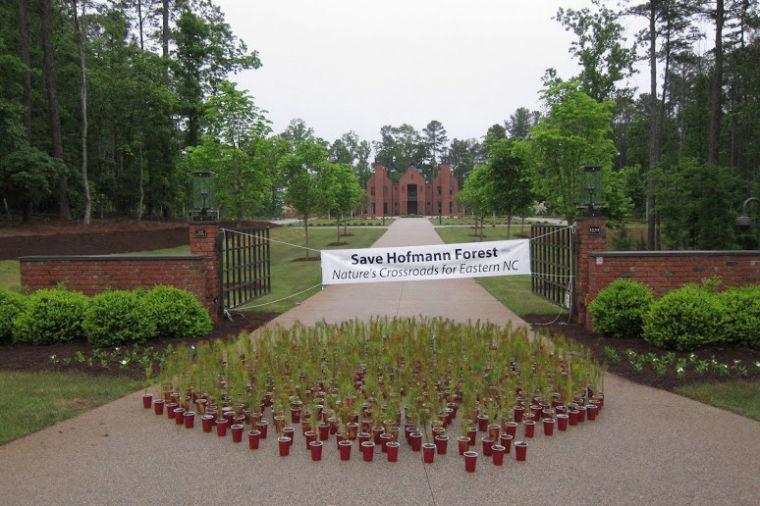Protesters left a collection of baby pine trees in front of Chancellor Randy Woodson’s house May 6 in objection to the planned sale of N.C. State’s largest forest.
However, the protest could be a futile attempt to stop University executives from turning a valuable asset into a quick paycheck.
The 80,000-acre Hofmann Forest, owned by the N.C. State Natural Resources Foundation, generates $2 million annually from logging companies and donates the total profit to the N.C. State College of Natural Resources.
Hofmann, which also serves as an outdoor forestry lab, is a testament to sustainability—for every acre that is cut down another acre must be planted.
Mary Watzin, dean of the College of Natural Resources along with the NRF want to sell Hofmann Forest and invest returns in a stock portfolio, despite disapproval from faculty, students and foresters.
The buyer or the price hasn’t been identified, but Watzin and others expect over $100 million.
Ron Sutherland, an N.C. State graduate and conservation scientist for Wildlands Network, led the protesters with the help of four others.
Joe Roise, professor of forestry and environmental resources at N.C. State, participated in the protest as well. He said the event was about sustainability in general, not just the Hofmann sale.
“We wanted to address conservation and ethics,” Roise said.
“Our college used to be about conservation and sustainability, and by selling something that’s truly a conservation effort, and we’re stepping away from that.”
Roise said the University selling Hofmann isn’t a new idea, and has been discussed for decades. However, there was never enough support in the past.
According to Roise, a major reason for N.C. State maintaining control of the forest is because foresters formerly controlled the NRF.
Foresters in general want to keep the forest for as long as possible and generate money at a consistent rate while sustaining the land for future use, Roise said.
“The whole profession of forestry was founded on and still revolves around sustainability,” Roise said. “Conservation is not about preserving everything for the sake of preservation, it is to use the resources wisely.”
In 2008, the NRF was merged and the foresters lost control of Hofmann Forest.
“The [NRF] board is now a group of industrial-type-people and non-foresters,” Roise said. “Their perspective isn’t conservation, it’s about money.”
Selling Hofmann Forest will support the University in the short run, Roise said, but the sale’s profit will eventually run out, as opposed to guaranteed income in the future.
However, Roise said Hofmann’s value cannot just be measured monetarily.
The forest is used for education and research and has been a major conservation effort for more than 70 years, according to Roise, and the University abandoned that idea “for the highest cash flow.”
“There’s conflict between people that want to have short term cash versus people who want a long term sustainable system and to treat to land with respect,” Roise said. “We’re all about the future. We love the college and we want to protect it for as long as possible.”








